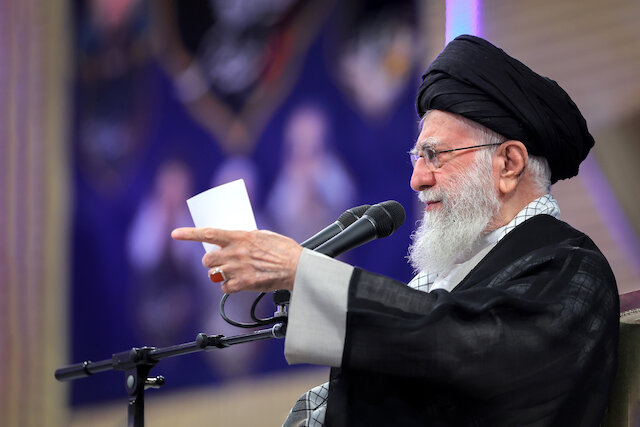Western officials claiming to defend human rights, the very supporters of massacre of Gaza children

Imam Khamenei described the principal purpose behind honoring the martyrs as promoting reflection and drawing lessons from their lives. Elaborating on the spiritual, verbal, and practical characteristics of the martyred president, he said that, “Martyr Raisi was a complete embodiment of the characteristics of an official in a divine government. With tireless dedication, he served the people, and he defended the dignity, honor, and credibility of the Iranian nation. This path and this approach offer a great lesson for all of us officials, for the youth, and for future generations.”
The Leader of the Revolution regarded distancing oneself from Pharaoh-like governance and advancing toward divine governance as an essential standard for managing the country, identifying Martyr Raisi as a perfect representation of this principle.
Citing Quranic verses, he stated: “arrogance, belittling the people, and placing the burden of responsibility upon them are among the traits of Pharaoh-like rule. Martyr Raisi stood in stark contrast to such traits. He regarded himself as being among the people, and in some cases, even lower than them, and it was with this perspective that he governed the country.”
Imam Khamenei regarded utilizing all available capacities in the service of God’s servants, and avoiding any personal exploitation of the political and social positions that come with authority, as among the key lessons of Martyr Raisi’s life, adding that, “There are many individuals within the Islamic system who are adorned with these traits, but these characteristics and lessons must be transformed into public culture.”
He emphasized that a person’s heart, speech, and actions are the three fundamental elements for recognizing their character. Referring to these in the case of Martyr Raisi, he said: “He [Martyr Raisi] possessed a humble and God-remembering heart, a frank and truthful tongue, and tireless, continuous action.”
The Leader stated that Martyr Raisi’s humility, prayer, supplication, and spiritual intimacy with God were constant characteristics throughout all stages of his responsibility and beyond. Imam Khamenei continued by saying that, “His heart overflowed with compassion for the people. Without expressing complaints about their expectations or harboring pessimism toward them, he was constantly concerned about fulfilling the heavy duties he bore.”
Imam Khamenei noted that Martyr Raisi’s manner of speaking, even in the realm of diplomacy, was marked by clarity and honesty: “He would adopt clear and explicit positions and never allowed the enemy to pretend that Iran had been brought to the negotiating table through threats, inducement, or tricks.”
Imam Khamenei further emphasized that the aim of the other side’s insistence on direct negotiations was to create the perception that Iran had surrendered and that Martyr Raisi never allowed this perception to take root. Imam Khamenei added that, “Of course, indirect negotiations took place during his term similar to what’s happening now. Needless to say, there was no result. We don’t think these will yield results now either. We don’t know what will happen.”
Imam Khamenei also cautioned the American side, saying: “For the Americans to say, “We won’t allow Iran to enrich uranium,” is utter nonsense. We aren’t waiting for anyone’s permission. The Islamic Republic has certain policies, and it will pursue them.”
Referring to the insistence of the Americans and certain Western countries on halting enrichment in Iran, the Leader stated: “At a suitable time, I will speak to the nation about the true intention and goal behind this insistence.”
Imam Khamenei, highlighting Martyr Raisi’s clarity and sincerity, said: “To grasp the significance of his manner of speaking, one must compare it to the duplicitous language used by the officials of certain Western governments — those who loudly claim to defend peace and human rights, deafening the world with their slogans, while shutting their eyes to the massacre of more than 20,000 innocent children in Gaza — and even supporting the criminals who commit these atrocities.”
He then described Martyr Raisi’s extraordinary work ethic and practical commitment as another dimension of his excellence, reiterating that, “He was constantly working and striving. He recognized neither exhaustion nor the division of day and night when it came to providing continuous, high-quality service.”
Imam Khamenei pointed to various services carried out by Martyr Rais, such as water supply, road construction, job creation, reviving dormant and shuttered workshops, and completing unfinished and stalled projects, as tangible, direct services for the people. He added the fact that Martyr Raisi also served the nation’s honor, dignity, and international standing, and he enhanced them.
The Leader referred to international financial centers’ reports showing Iran’s economic growth, rising from nearly zero at the beginning of the 13th administration to nearly 5% at its end, as a source of national pride and honor, and an indication of the country’s progress. He further stated: “The fact that the President [Martyr Raisi] held up the Quran and held up a picture of Martyr Soleimani in a UN General Assembly is a source of pride for the nation.”
| © | KHAMENEI.IR |


